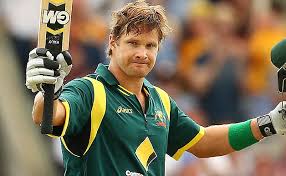Has Watto played his last ODI?
Date: March 6, 2015 / Posted by Glenn Mitchell
 The selectors have finally lost faith in Shane Watson – after 14 months of modest form in the one-day arena he was dropped for the match against Afghanistan at Perth yesterday.
The selectors have finally lost faith in Shane Watson – after 14 months of modest form in the one-day arena he was dropped for the match against Afghanistan at Perth yesterday.
He was then forced to watch his teammates, in the words of Geoffrey Boycott, “fill their boots”.
A World Cup record 6-417 was plundered with David Warner leading the charge with 178 while Steve Smith, the replacement at number three making 95 and Glenn Maxwell 88 off a mere 39 balls.
It would have been a bitter pill for Watson to swallow.
But, in essence, he has only himself to blame.
He was given an extended run in the hope he would find form but alas it was not to be.
He opened his World Cup campaign with a golden duck against England and followed up with 23 – albeit third highest-score – in Australia’s loss to New Zealand.
He also failed to make the most of his two starts in the practice matches heading into the tournament with 34 against the UAE and 22 against India.
It was the continuation of a protracted lean trot.
His past 11 ODI innings – dating back to January 2014 – produced 245 runs at 22.3.
In that period there was just the one half-century – 82 against South Africa at Sydney last November – and three ducks.
Each of those innings was played at number three in the order.
Whilst his batting form has been scratchy for over a year his bowling has been problematic for even longer.
Since 1 January 2013 he has played 28 ODIs for just nine wickets at 73.7 with an economy rate of 5.8.
In his four ODIs this year he has bowled just 15 overs and gone wicket-less.
It is principally the one-day arena that has been Watson’s strength in international cricket.
Despite Warner’s best efforts yesterday he still holds the Australian record – 185no against Bangladesh at Dhaka in April 2011.
His overall record in his 182-match one-day career is solid – 5501 runs at 40.1 and 164 wickets at 31.2.
But in the last year or so he has been a shadow of his former self.
His form virtually forced the selectors to make a change.
With James Faulkner cleared to play his first match of the tournament someone had to give way.
The two in the firing line were Watson and Maxwell.
For team balance, and given the fact that his numbers were nowhere near as strong as desired, it was Watson who made way.
The move to number three for Smith proved to be no problem at all – albeit against an Afghan attack.
It was Smith’s eighth knock in the pivotal first-drop position, in which he now has an average of 67.6 and from where he has scored two of his three ODI centuries.
Smith’s inventiveness allied to a solid defence makes him an ideal candidate for the position and given he is going to be around for a long time to come – most likely as skipper for the large part – his ascension to the spot permanently makes good sense.
For Watson it is now a matter of injury being the provider of a recall in this World Cup for he is no longer considered to be in the best XI.
And should he return it will be down the order.
The sight of a limping Mitch Marsh during his bowling spell last night may just reopen the door for Watson although depending on the pitches that will confront Australia in the remaining matches there may even be the prospect that George Bailey could sneak back ahead of him.
With his 34th birthday looming in June Watson is now walking a tightrope with respect to his ODI career.
In fact, his entire international career may well be at the crossroads.
Whether the lights will turn green for him again in the one-day arena is a matter of conjecture.
First published on The Roar – theroar.com.au – on 5 March 2015






